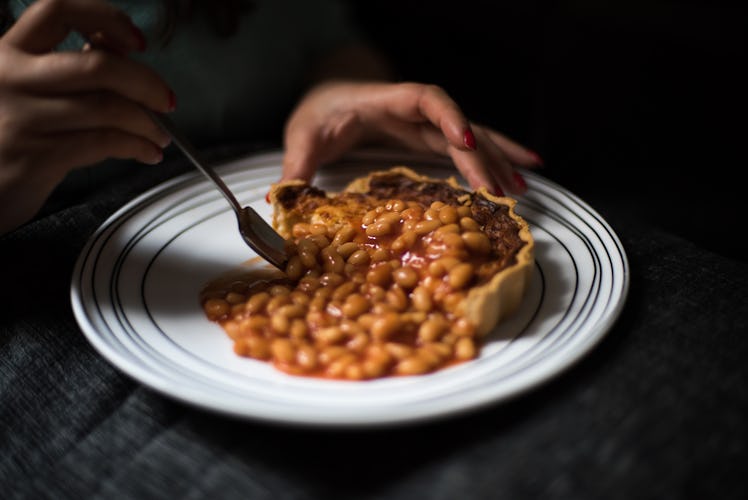Why Do Beans Make You Fart? A Dietician Explains
Rich in protein, fiber, and vitamins, beans really are a magical fruit. Claims about their fart-inducing powers have some truth to them, but are likely overblown.

Beans are a staple meal for billions of people around the world and one of the most important crops there is. Rich in protein, fiber, and vitamins, (USDA dietary guidelines list them as both a protein and vegetable) they deserve a place at the table of just about any meal. They also are notoriously hard to digest — at least that’s what your kids’ songs would have you believe. Beans, beans, the musical fruit, get a bad rap for the way they make you toot. But do beans really make you fart? When your kids ask you this important question — and they will, it’s only a matter of time — you should be prepared to answer it. Here’s what the experts say.
First of all, it’s important to note that “not everyone is affected,” says dietician Su-Nui Escobar. This statement might seem like a punt on the question, but that’s what the numbers show us. She cites a study in which less than half of participants reported flatulence after eating pinto or baked beans, and only 11% did when eating black-eyed peas.
The researchers behind the study expressed concern that people were passing up beans because of concerns about gassiness, despite beans being a low-cost, nutrient-rich, plant-based source of protein that lowers cholesterol and reduces the risk of chronic disease. They concluded that “concerns about excessive flatulence from eating beans may be exaggerated” and “It is important to recognize there is individual variation in response to different bean types.” The study was relatively small, comprising only 86 people, but there’s consensus among experts that not everyone farts up a storm after eating beans.
But beans do make some people fart. Why, exactly? Any gassiness you do experience after eating beans is likely the culprit of their high fiber intake and the presence of a complex sugar called raffinose, both of which are hard to digest. “It goes to most of the body undigested until it reaches the large intestine, where bacteria breaks it down, producing methane gas in the process,” says Escobar. In the aforementioned study, participants were more likely to report farting more after eating pinto beans, which have more fiber than black-eyed peas.
But fiber is good for us, specifically as a prebiotic to feed the microbiome. So that gassy side effect isn’t a fundamental flaw of the bean, but actually a benefit in disguise. Since fiber is hard to digest, it often ends up in the lower intestine still intact, where good bacteria feed off of it and thrive. A more diverse population of gut bacteria allows for better digestion and less inflammation. Changes in the microbiome can happen rapidly in response to what we eat. Dramatic changes have been observed in as little as 24 hours — all the more reason to consume high fiber foods like beans regularly.
Still, gas is not a necessary side effect of fiber, and if it does occur, it’s likely to subside over time. Although 50% of study participants reported farting more often during the first week of eating pinto beans, that number dropped to 6% by the second week. By the third week, 70% of participants said eating the same amount of beans no longer made them gassy.
Escobar recommends slowly introducing beans into your diet so your body has time to adjust to the increase in fiber intake. You can try soaking dry beans for 12 hours before cooking them, Escobar says, citing a study done in India that found that a 12-hour soak left the lowest levels of gas-inducing sugars. “Discard the water used for soaking, and cook the beans in freshwater. This will help get rid of some of the oligosaccharides (sugars that exist in beans that cause gas) that may have leached into the water,” Escobar says.
Escobar says that gas is a normal, healthy part of digestion. It’s not a cause for concern unless it comes with stomach pain or severely limits daily activities. In that case, Escobar says you might consider consulting a doctor to rule out leaky gut, irritable bowel syndrome (IBS), or Crohn’s disease, as people with these conditions are advised to avoid legumes, which can trigger symptoms.
This article was originally published on